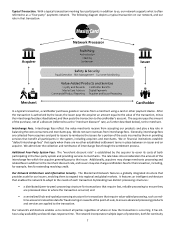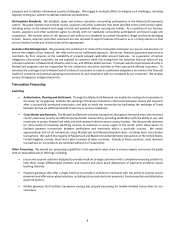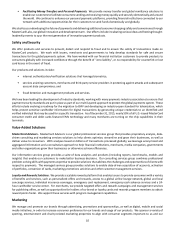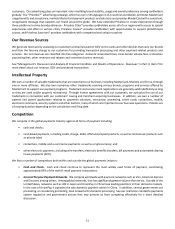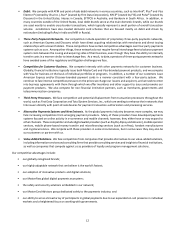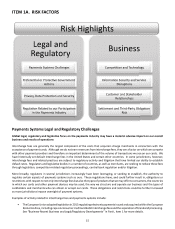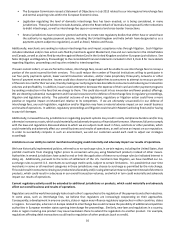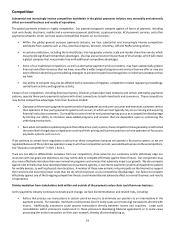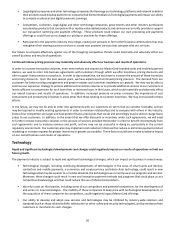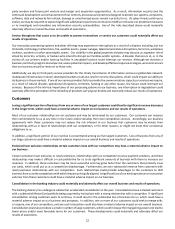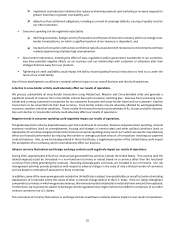MasterCard 2015 Annual Report Download - page 23
Download and view the complete annual report
Please find page 23 of the 2015 MasterCard annual report below. You can navigate through the pages in the report by either clicking on the pages listed below, or by using the keyword search tool below to find specific information within the annual report.17
As a result, the risks created by any one new law or regulation are magnified by the potential they have to be replicated in other
jurisdictions or involving other products, affecting our business. These include matters like interchange rates, network standards
and network exclusivity and routing agreements. Conversely, if widely varying regulations come into existence worldwide, we
may have difficulty adjusting our products, services, fees and other important aspects of our business, with the same effect.
Either of these outcomes could materially and adversely affect our overall business and results of operations.
Preferential or Protective Government Actions
Preferential and protective government actions related to domestic payment services could adversely affect our ability to
maintain or increase our revenues.
Governments in some countries, such as China, Russia and India, have acted, or in the future may act, to provide resources,
preferential treatment or other protection to selected national payment and processing providers, or have created, or may in
the future create, their own national provider. This action may displace us from, prevent us from entering into, or substantially
restrict us from participating in, particular geographies, and may prevent us from competing effectively against those providers.
For example:
• Governments in some countries are considering, or may consider, regulatory requirements that mandate processing of
domestic payments either entirely in that country or by only domestic companies. In particular, Russia has amended
its National Payments Systems laws to require all payment systems to process domestic transactions through a
government-owned payment switch. As a result, all MasterCard domestic transactions in Russia are now processed by
that system instead of by MasterCard.
• Regional groups of countries, such as the Gulf Cooperation Countries in the Middle East and a number of countries in
South East Asia, are considering, or may consider, efforts to restrict our participation in the processing of regional
transactions.
Such developments would prevent, and in Russia have prevented, us from utilizing our global processing capabilities for domestic
or regional customers. Our efforts to effect change in, or work with, these countries may not succeed. This could adversely
affect our ability to maintain or increase our revenues and extend our global brand.
Privacy, Data Protection and Security
Regulation of privacy, data protection and security could increase our costs, as well as negatively impact our growth.
We are subject to regulations related to privacy, data protection and information security in the jurisdictions in which we do
business. These regulations could result in negative impacts to our business. As we continue to develop products and services
to meet the needs of a changing marketplace, we may expand our information profile through the collection of additional data
across multiple channels. This expansion could amplify the impact of these regulations on our business. Regulation of privacy
and data protection and information security may require changes to our data practices in regard to the collection, use, disclosure
or security of personal and sensitive information. In addition, due to the European Court of Justice’s recent invalidation of the
Safe Harbor treaty, we may be subject to enhanced compliance and operational requirements in the European Union. Failure
to comply with these laws, regulations and requirements could result in fines, sanctions or other penalties, which could materially
and adversely affect our results of operations and overall business, as well as have an impact on our reputation.
New requirements in these areas, either from new regulations or laws or any additions or changes (as well as the manner in
which they could be interpreted or applied) may also increase our costs and could impact aspects of our business such as fraud
monitoring, the development of information-based products and solutions and technology operations. In addition, these
requirements may increase the costs to our customers of issuing payment products, which may, in turn, decrease the number
of our cards and other payment devices that they issue. Moreover, due to recent account data compromise events at large, U.S.-
based retailers, as well as the disclosure of the monitoring activities by certain governmental agencies, there has been heightened
legislative and regulatory scrutiny around the world that could lead to further regulation and requirements. Any of these
developments could materially and adversely affect our overall business and results of operations.


